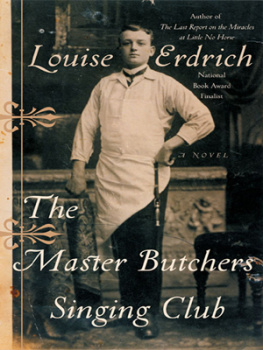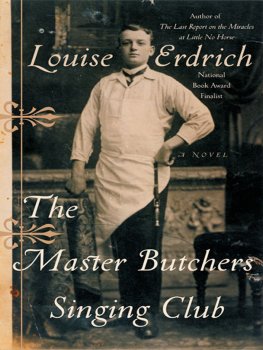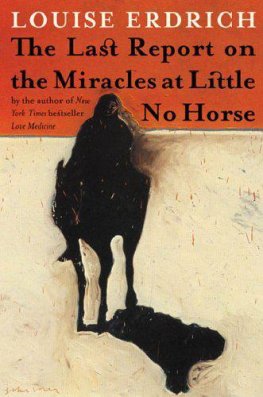Louise Erdrich
The Antelope Wife

The niizhoodenhyag are very old when they decide to sew this world into being. One twin uses light and the other dark. The first twins beads are cut-glass whites and pales, and the other twins beads are glittering deep red and blue-black indigo. One twin uses an awl made of an otters sharpened penis bone, the other uses that of a bear. They sew with a single sinew thread, in, out, fast and furious, each woman trying to set one more bead into the pattern than her sister, each trying to upset the balance of the world.
Scranton Roy
Deep in the past during a spectacular cruel raid upon an isolated Ojibwe village mistaken for hostile during the scare over the starving Dakota, a dog bearing upon its back a frame-board dikinaagan enclosing a child in moss, velvet, embroideries of beads, was frightened into the vast carcass of the world west of the Otter Tail River. A cavalry soldier, spurred to human response by the sight of the dog, the strapped-on child, vanishing into the distance, followed and did not return.
What happened to him lives on, though fading in the larger memory, and I relate it here in order that it not be lost.
Private Scranton Teodorus Roy was the youngest son of a Quaker father and a reclusive poet mother who established a small Pennsylvania community based on intelligent conversation. One day into his view a member of a traveling drama troupe appeared. Unmasked, the womans stage glance broke across Roy like fire. She was tall, fatefully slender, pale, and paler haired, resolute in her character, and simple in her amused scorn of Roy so young, bright faced, obedient. To prove himself, he made a rendezvous promise and then took his way west following her glare. An icicle, it drove into his heart and melted there, leaving a trail of cold water and blood. The way was long. She glided like a snake beneath his footsteps in fevered dreams. When he finally got to the place they had agreed upon, she was not there, of course. Angry and at odds, he went against the radiant ways of his father. He enlisted in the army and was sent to join the cavalry at Fort Snelling on the banks of the Mississippi in St. Paul, Minnesota.
There, he was trained to the rifle, learned to darn his socks using a wooden egg, ate many an ill-cooked bean, and polished his officers harness leather until one day, in a state of uneasy resignation, he put on the dark blue uniform, fixed his bayonet, set off marching due west.
The village his company encountered was peaceful, then not.
In chaos of groaning horses, dogs screaming, rifle and pistol reports, and the smoke of errant cooking fires, Scranton Roy was most disturbed not by the death yells of old men and the few warriors shocked naked from their robes, but by the feral quiet of the children. And the sudden contempt he felt for them all. Unexpected, the frigid hate. The pleasure in raising, aiming. They ran fleet as their mothers, heading for a brush-thick gully and a slough of grass beyond. Two fell. Roy whirled, not knowing whom to shoot next. Eager, he bayoneted an old woman who set upon him with no other weapon but a stone picked from the ground.
She was built like the broken sacks of hay hed used for practice, but her body closed fast around the instrument. He braced himself against her to pull free, set his boot between her legs to tug the blade from her stomach, and as he did so tried to avoid her eyes but did not manage. His glare was drawn into hers and he sank with it into the dark unaccompanied moment before his birth. She broke his gaze. In a groan of heat and blood she cried a word that would reverberate in his mind until the last moment of his life. He yanked the bayonet out with a huge cry, and began to run.
That was when he saw the dog, a loping dirt-brown cur, circle the camp twice with the child on its back and set off into open space. As much to escape the evil confusion of this village and his own dark act as out of any sympathy for the baby, though he glimpsed its face mystified and calm Scranton Roy started running after the two. Within moments, the ruckus of death was behind him. The farther away the village got, the farther behind he wanted it. He kept on, running, walking, managing to keep the dog in view only because it was spring and the new grass, after a burn of lightning, was just beginning its thrust, which would take it to well over a full-grown mans height.
From time to time, as the day went on, the dog paused to rest, stretched patient beneath its burden. Grinning and panting, it allowed Roy to approach, just so far. A necklace of blue beads hung from the brow guard of the cradle board. It swayed, clattered lightly. The childs hands were bound in the wrappings. She could not reach for the beads but stared at them, mesmerized. The sun grew razor-hot. Tiny blackflies settled at the corners of her eyes. Sipped moisture from along her lids until, toward late afternoon, the heat died. A cold wind boomed against Scranton Roy in a steady rush. Still, into the emptiness, the three infinitesimally pushed.
The world darkened. Afraid of losing the trail, Roy gave his utmost. As night fixed upon them, man and dog were close enough to hear each other breathing and so, in that rhythm, both slept. Next morning, the dog stayed near, grinning for scraps. Afraid to frighten it with a rifle shot, Roy hadnt brought down game although hed seen plenty. He managed to snare a rabbit. Then, with his tinderbox and steel, he started a fire and began to roast it, at which smell the dog dragged itself belly-down through the dirt, edging close. The baby made its first sound, a murmuring whimper. Accepting tidbits and bones, the dog was alert, suspicious. Roy could not touch it until he thought to wash himself all over and approach naked to diminish his whitemans scent.
So he was able at last to remove the child from its wrappings and bathe it, a girl, and to hold her. Hed never done such a thing before. First he tried to feed her a tiny piece of the rabbit. She was too young to manage. He dripped water into her mouth, made sure it trickled down, but was perplexed at what to feed her, then alarmed when, after a night of deprivation, her tiny face crumpled in need. She peered at him in expectation and, at last, violently squalled. Her cries filled a vastness that nothing else could. They resounded, took over everything, and brought his heart clean to the surface. Scranton Roy cradled the baby, sang lewd camp tunes, then stalwart hymns, and at last remembered his own mothers lullabies. Nothing helped. It seemed, when he held her close upon his heart as women did, that the child grew angry with longing and desperately clung, rooted with her mouth, roared in frustration, until at last, moved to near insanity, Roy opened his shirt and put her to his nipple.
She seized him. Inhaled him. Her suck was fierce. His whole body was astonished, most of all the inoffensive nipple hed never appreciated until, in spite of the pain, it served to gain him peace. As he sat there, the child holding part of him in her mouth, he looked around just in case there should be any witness to this act which seemed to him strange as anything that had happened in this sky-filled land. Of course, there was only the dog. Contented, freed, it lolled appreciatively near. So the evening passed and then the night. Scranton Roy was obliged to change nipples, the first one hurt so, and he fell asleep with the baby tucked beside him on his useless teat.
She was still there in the morning, stuck, though he pulled her off to slingshot a partridge, roasted that too, and smeared its grease on his two sore spots. That made her wild for him. He couldnt remove her then and commenced to walk, holding her, attached, toward a stand of cottonwood that wavered in the distance. A river. A place to camp. Hed settle there for a day or two, he thought, and try to teach the baby to eat something, for he feared shed starve to death although she seemed, except for the times he removed her from his chest, surprisingly contented.












